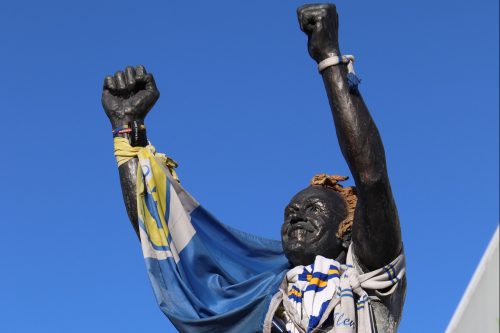Leeds United’s promotion could see city net multi-million pound goal

It’s happened. After 5,907 days Leeds United is back in the top flight of English football.
Last night, Marcelo Bielsa’s men beat Derby County, however their place in the Premier League was secured on Friday night by fellow Yorkshire team Huddersfield’s victory over West Bromwich Albion. But what does this mean for the club, the economy and the wider region?
It’s certain that returning to the top tier of English football will provide a welcome income boost for the historic team. Deloitte’s Sport Business Group suggests it could provide at least £160m over the next three seasons. However, this financial boost could be in excess of £300m if the club can stay up beyond the 20/21 season.
This year however the impact of Covid-19 is even being felt in the funding for football with reports suggesting that promoted clubs will be subject to a reduction of c.£8m in central distributions – meaning Leeds will likely receive £85m this year, with the remainder of the minimum figure comprised of parachute payments in 2021/22 and 2022/23 seasons if Leeds don’t stay up.
The impact of Covid-19, which at one point looked like it might cost Leeds it’s promotion with talk of the season being written off, is actually costing the game £330m, as a result of a broadcast rebate which is due to be given back to domestic and overseas broadcasters who were unable to air games for 12 weeks.
Thankfully however it was announced last week that fans should be able to return to stadiums in October (subject to a successful pilot programme), meaning that the club will be able to benefit from the additional matchday commercial revenue brought about by promotion.
In fact, speaking to TheBusinessDesk.com last week ahead of the Prime Ministers announcement on Friday, former Leeds United defender, Danny Mills highlighted the wider commercial impact of being promoted beyond the TV rights payments.
He said: “I don’t think people understand the impact. Media interest goes from national to global overnight.” Ultimately this interest, he highlights, benefits the club as suddenly because Leeds is being talked about more, “more people buy a shirt, more sponsors look to get involved and more people want to be associated with the club’s success – so corporate hospitality sales increase.”
However, Mills is keen to point out that promotion means more than just the financial impact it brings the club. Being back in the premier league means “Leeds as a club and as a city is really back on the map and you’re exporting that brand overnight to another 50 countries.”
Perhaps the easy way to plan for the wider economic impact is to look at the 17/18 season when Huddersfield Town took their place in the league for the first time. Back then experts from the University of Huddersfield suggested the Terriers debut season in the premier league could add £5m for the local economy. But for Leeds could that be bigger?
The financial benefit for the city – which is obviously subject to Covid-19 regulations- might be difficult to quantify, but as Mills explains, stems in part from an increase in media interest.
He said, “Rather than having 10 or 12 media people turn up to a game, suddenly it becomes in the 20, 30 or 40 and all the [TV] cameras now need to be there.”
This interest directly supports the local economy and particularly the currently hard-hit hospitality industry. As increased media interested and more broadcaster attendance might mean that 50 or 60 hotel rooms need to be booked in the city. Add to that travelling fans who will want to come to games or even those from overseas who might just want to be in the city to be close to the action and you can see a potential positive impact on the city’s visitor economy.
Away from city, there has often been much talk of football being associated with foreign direct investment into cities. This however can sometimes be over-estimated says Dr Daniel Parnell, a senior lecturer in Sport Business at the University of Liverpool. He explained to TheBusinessDesk.com that international investment in Manchester is “not just about football”. He highlights that a lot of interest can be the result of large-scale redevelopment or infrastructure programmes such as HS2.
So perhaps Premier League football won’t be the silver bullet for foreign director investment that it is implied to be amongst certain demographics but as Mills said, having the brand in front of 200m people globally each week won’t do it any harm.
The final benefit to the local economy from Leeds United promotion, might as we enter an economic downturn, be the most important – a greater access to the Premier League’s Charitable Fund. Parnell explains, “Leeds United are already in the Premier League family with its charitable foundation, but they will now access a lot more funding because of being in the Premier League.” This means the club’s foundation should be able to do more with the local community.
Ultimately, we’ll have to wait and see what the final economic impact of Leeds United’s return to the Premier League is. But for now, fans can celebrate, as Tim Bridge, director of the Sports Business Group at Deloitte, said: “Leeds United’s return to the Premier League after an absence of 16 seasons, and a number of near-misses in recent years, will deliver a welcome return to the global stage for one of England’s most well-supported clubs. It will be exciting for one of the UK’s biggest cities to see the resumption of a number of old-rivalries and Elland Road broadcast worldwide.”








